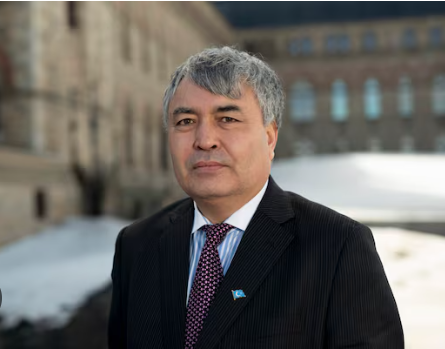Secondary menu
An Interview with Mehmet Tohti: China is Laughing
By: Mackenzie Birbrager (1L)

Photo Credit: The Globe and Mail
Mehmet Tohti, a Uyghur-Canadian activist, has made a name for himself in Ottawa. Born in Kashgar, China (a city in the Xinjiang Uyghur Autonomous Region), Mehmet self-exiled at 26 due to the worsening conditions for Uyghurs. While the Chinese Community Party (CCP) has been discriminating against Uyghurs for decades, in 2014, the Chinese government instituted a policy of genocide against Uyghurs. Since arriving in Canada, Mehmet has been a fervent advocate for the Uyghur people and against the CCP’s ongoing genocide against Uyghurs. In response, the Chinese state police have followed, hacked, and repeatedly threatened Mehmet. In 2023, he got a call from the Chinese government notifying him that his mother and two sisters were dead. He suspects that they died in a “re-education” camp. Since 2014, millions of Uyghurs have been arbitrarily detained in concentration camps. The whereabouts of his other 30 family members remains unknown. Despite these vile attempts to silence his activism, Mehmet has remained steadfast in speaking out for the Uyghur cause.
I recently spoke with Mehmet, at this critical juncture both in Canadian politics, on the heels of a snap election, and in global politics, with the Trump administration’s growing assault on democracy. As a formidable human rights defender, I wanted to find out what his thoughts were on the implications of the United States (U.S.) tariffs against Canada and President Trump’s attack on democracy. Mehmet knows all too well that when democracy is under attack, authoritarian regimes are emboldened.
AN UNPRECEDENTED SHIFT
When Trump announced tariffs on Canada, Mehmet was not only thinking about price hikes at grocery stores or gas pumps. He knew that when two democratic allies fight, there is only one clear winner — autocratic regimes. When democracies are busy sparring against one another, they detract from their joint efforts to ensure fundamental freedoms for all which is a sure victory for authoritarian governments whose power is predicated on thwarting such freedoms.
Remarking on how the Trump administration's economic policies are ultimately benefiting China, Mehmet noted that while democratic countries once pushed to decouple from China, Canada is now moving to decouple from the U.S. Historically, the U.S. and Western countries criticized China for weaponizing its economy, and now, the U.S. is using that very tactic to penalize its allies. Arguably, the position of Russia and China in the global order has grown much stronger since Trump’s second presidential victory. In Mehmet’s view, Western allies fighting each other has “China laughing behind the scenes”.
As a vocal opponent of China’s growing power, Mehmet has reminded Canadian politicians that their efforts in speaking up against China are not fruitless. He notes that from time to time, China has conceded to Western pressure, changing its foreign policy, at least superficially. However, now, the uphill battle in countering China’s increasing dominance is much steeper. When human rights are seemingly off the table, it is a green light for China’s ongoing genocide against Uyghurs. Mehmet knows that the Chinese government is fully aware of the changing geopolitical landscape and recognizes that fewer obstacles, by way of respect for human rights, stand in the way of its genocidal policies. Consequently, millions of Uyghurs will pay a dear price, one that is much more costly than the plummeting DOW.
A GOLDEN ERA FOR CHINA
When speaking with Mehmet, I was particularly curious about his opinions on the U.S. Secretary of State, Marco Rubio. As a Senator, Rubio was one of the most formidable opponents of China, co-authoring the Uyghur Forced Labour Prevention Act. Mehmet echoes the growing sentiment that, as Secretary of State, Rubio has abandoned his previously held values that defined his Senate record to capitulate to Trump. Regrettably, Rubio is justifying Trump’s reckless foreign policy through diplomacy.
Mehmet embodies the power of civil society in effecting policy. Mehmet founded the Uyghur Rights Advocacy Project in 2020. In just five years, he has testified before the House of Commons and Senate on numerous occasions and successfully lobbied the House of Commons to declare China’s treatment of Uyghurs a genocide, and pass a motion to resettle 10,000 Uyghurs in Canada. With Trump cutting funding from USAID, Mehmet warns that this move could potentially signal cuts to civil society organizations (CSOs). If that happens, the Uyghur cause will be undermined. In regard to the Uyghur issue, without the support of CSOs, much of what we know about the CCP’s transnational repression would remain hidden, including forced labour, family separation, sterilization, and religious eradication. In Mehmet’s view, the vital tools that enable CSOs to do research and collect evidence may soon be in jeopardy.
Mehmet is a valuable voice in these tiring times. As an exiled Uyghur and proud Canadian activist, he strives to create a better Canada by pressuring the government to hold China accountable for its abysmal human rights record. His work is important because China’s treatment of the Uyghurs is a microcosm of China’s authoritarianism and changing global order. The Trump administration, in both its domestic and foreign policy, is eroding human rights and helping to shape the global terrain into one that is much more cordial to China.
In anticipation of a new federal government, Mehmet says he wants a Canada that does not compromise its values when dealing with the U.S. and China. In the face of growing economic pressure from U.S. tariffs, this means being intentional when diversifying to new markets and not running to China in the face of growing hostile U.S. relations. Following the federal government’s announcement concerning China’s execution of four Canadians convicted of drug charges earlier this year, one thing is clear: China is no friend of Canada.
